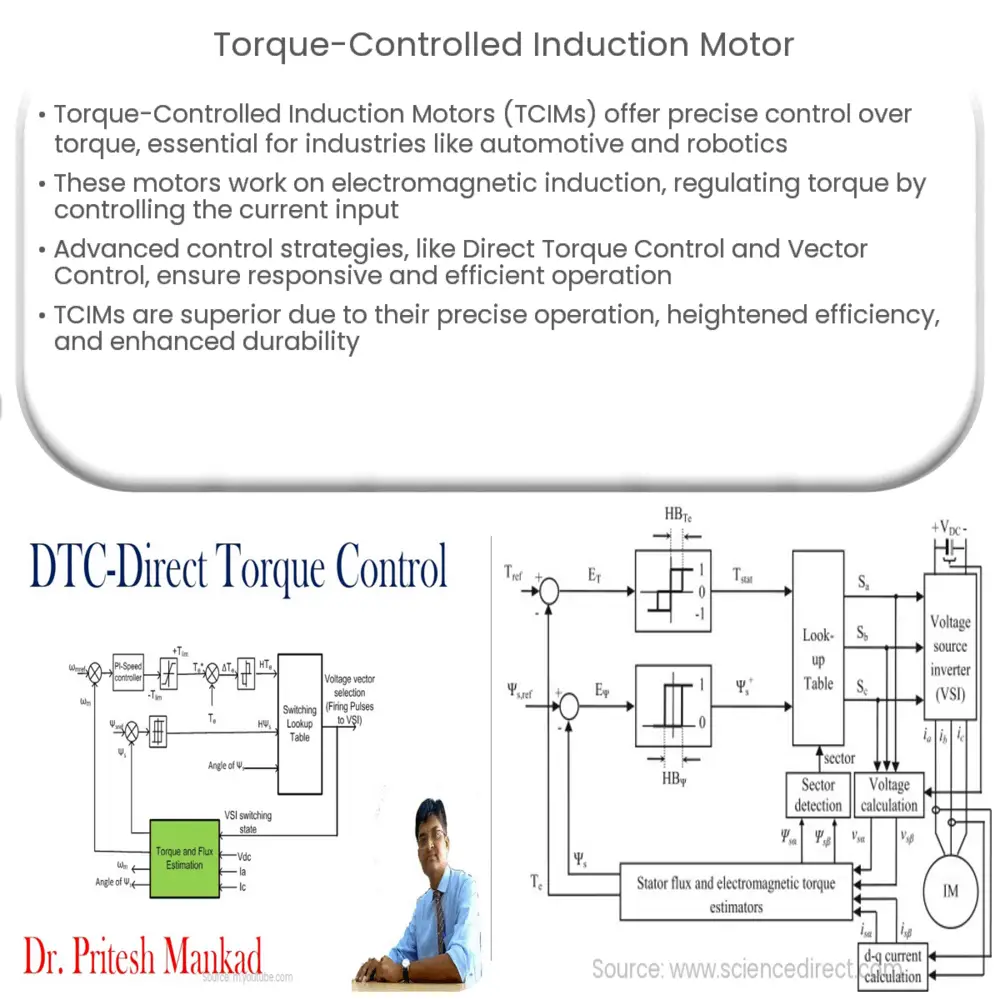Explore the world of torque-controlled induction motors, their working principles, applications, and benefits in industries like automotive and robotics.

Torque-Controlled Induction Motors: An Overview
Induction motors, also known as asynchronous motors, are electric motors that function by exploiting the principles of electromagnetic induction. Among these motors, a particular class of importance is the Torque-Controlled Induction Motor. This type of motor grants users precise control over the torque produced, making them critical for specific industrial and automotive applications.
Working Principle
Induction motors operate on the principle of electromagnetic induction, where a current is induced in the rotor by changing magnetic fields. However, in torque-controlled induction motors, the torque output is specifically regulated, which is achieved by controlling the current input.
- Stator: The outer part of the motor, the stator, is typically composed of three-phase windings. When an alternating current is passed through these windings, it generates a rotating magnetic field.
- Rotor: The rotor, located inside the stator, follows the rotating magnetic field induced by the stator and rotates, which in turn drives the attached load.
Torque Control
In a standard induction motor, the torque output is not directly controlled. Instead, it is determined by the slip, which is the difference between the rotor speed and the speed of the stator’s rotating magnetic field. However, torque-controlled induction motors are designed to provide a higher level of control over the torque output. This is achieved by varying the current supplied to the motor, which in turn changes the strength of the magnetic field and thus the torque produced.
- Direct Torque Control (DTC): DTC is a method where the inverter output voltage is adjusted in real-time to control the torque and flux in the motor. It offers fast and precise torque control.
- Vector Control: Also known as field-oriented control, this method involves orienting the stator current in such a way that one component produces magnetic flux, and the other produces torque, allowing independent control of both.
These advanced control strategies allow for a more responsive and efficient operation of the motor, making torque-controlled induction motors highly beneficial for applications where rapid and precise torque adjustments are required.
Applications of Torque-Controlled Induction Motors
Torque-controlled induction motors are instrumental in a wide range of industries due to their enhanced control capabilities.
- Automotive Industry: Electric vehicles require precise torque control for better performance and energy efficiency. Torque-controlled induction motors enable smooth acceleration, regenerative braking, and improved handling.
- Industrial Automation: In industries where machinery must be operated with precision, torque-controlled induction motors are indispensable. They provide the ability to control the speed and torque of equipment, ensuring high-quality output and increased productivity.
- Robotics: Robots require precise control over their movements. Torque-controlled induction motors offer the requisite control, making them an integral part of robotics technology.
Benefits of Torque-Controlled Induction Motors
Torque-controlled induction motors offer several benefits over conventional induction motors. These include:
- Improved Performance: Due to their precise control over torque, these motors offer better performance in terms of speed and acceleration.
- Increased Efficiency: By precisely controlling the torque, these motors can operate at optimal efficiency, reducing energy consumption.
- Enhanced Durability: With direct control over torque, the risk of motor damage due to over-torquing is significantly reduced, resulting in increased motor lifespan.
Conclusion
In conclusion, torque-controlled induction motors play a vital role in various sectors, from automotive to industrial automation and robotics. With their superior torque control capabilities, they offer significant performance advantages over conventional induction motors. These motors enable precise operation, higher efficiency, and improved durability, making them an excellent choice for applications demanding exact control over motor torque. As technology continues to evolve, we can expect even more advancements in torque-controlled induction motors, providing further benefits and enhancing their already wide range of applications.

